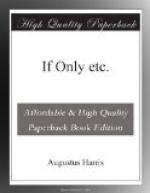“Jack! Jack! is this—the end?”
“Hush—no—no! Keep still—perfectly still—you must not move.”
“I am not—in pain—a little dizzy—nothing more, and my head feels light.”
“Drink this and don’t talk. As soon as you are a little recovered we will go home.”
“Home! Jack!”
Oh, the wistful look in the deep blue eyes—the prophetic droop about the perfect mouth! It was almost more than he could bear.
“I will go with you myself if you will do what I tell you, keep absolutely quiet—your life depends upon it.”
She looked up tremulously.
“I don’t care—a—cent now,” she whispered.
She bore the journey to Cecil Street better than they could hope, and the bleeding from the lungs had ceased.
Downstairs Saidie expressed a wish to remain all night with her sister.
“She ought not to be left,” she said.
“Most decidedly she must not be left,” replied Sir John—“I intend remaining with your sister.”
“You! Well, this beats all, upon my word!”
So great was Miss Blackall’s surprise that when she found herself ousted from the position of head nurse and the door metaphorically closed upon her, she had not a word to say, but called a hansom and had herself driven to Bayswater, where she had been living since her mother’s death, now nearly a year ago.
“And I used to think he didn’t amount to a row of pins,” she murmured with an odd sort of penitence. “Well, I guess I was wrong, that’s all.”
Through the long hours of that never-ending night John Chetwynd watched by Bella’s bedside. For the most part, she lay mute and inert, but towards morning she grew restless.
“I must talk,” she cried excitedly—“to see you sit there and to think—to remember—oh! if only I had run straight, Jack—I don’t think I was meant for this, do you?”
He had no words with which to answer her. He folded his arms across his chest and looked out vaguely into the slant of room beyond. The folding doors were open and on the sideboard he could see a basket full of peaches, at this season an extravagance denied his own table. On the mantelshelf to his right hand were some exquisite hot-house flowers, carelessly crushed into a cracked, cheap little vase, and a penny packet of stationery and a powder puff in a sprinkling of chalk.
She stretched out her arms so that her fingers touched him, and he held them tightly in his own—rings and all.
She was never meant for the life she had chosen!
His heart felt breaking.
The delicate features, the sweet, wistful, childish face, the pathos in her regretful cry—the past with its load of gall and shame and misery—which could never be obliterated. Never!
“Why do you look at me like that? I am better. I know I am better. I thought—I feared—I was going to die; if I had there was no one to care but—Saidie.”




